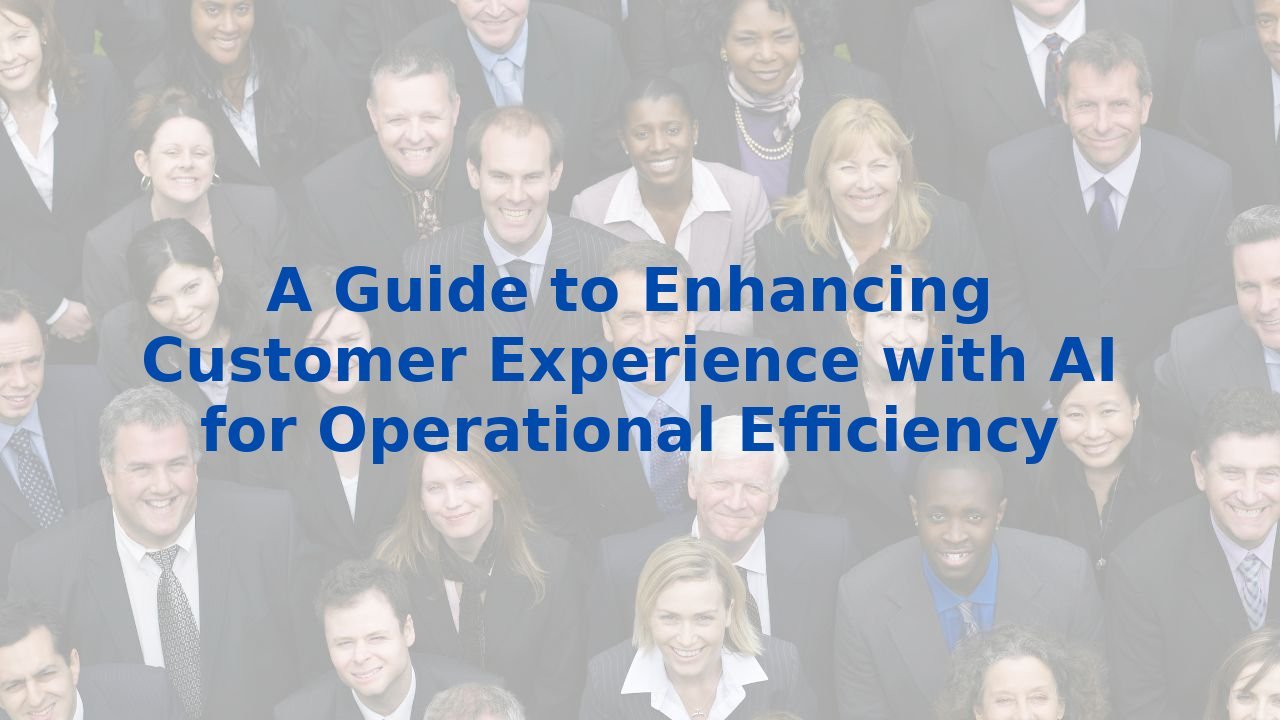A Guide to Enhancing Customer Experience with AI for Operational Efficiency

A Guide to Enhancing Customer Experience with AI for Operational Efficiency
In an era where customer expectations are soaring, delivering a stellar customer experience (CX) is no longer a luxury—it's a necessity. As we dive into the transformative potential of artificial intelligence (AI), it becomes clear that leveraging AI not only enhances CX but also optimizes operational efficiency. Businesses can find themselves navigating a landscape that's not only more responsive to customer needs but also dramatically more streamlined in their operations.
Understanding Customer Behavior
The heartbeat of any effective strategy lies in understanding your audience. Through AI and machine learning (ML), businesses can analyze vast troves of customer data. This data-driven approach unveils behaviors, preferences, and needs that were previously hidden. Imagine being able to tailor marketing strategies and products based on predictive insights. By utilizing AI to sift through purchase history, browsing patterns, and social media interactions, businesses can craft highly personalized marketing messages tailored to each customer.
Enhancing Customer Support
Customer service is often where the rubber meets the road. With AI-powered chatbots and virtual assistants, organizations now have the tools to handle routine inquiries efficiently. This not only alleviates the workload of human representatives but also empowers them to focus on more complex challenges. As these intelligent systems analyze customer interactions, they can identify trends and provide rapid solutions, leading to improved wait times and overall customer satisfaction.
Real-Time Engagement
In today's fast-paced market, the ability to engage customers in real time is a game-changer. AI facilitates instantaneous data analysis, allowing businesses to monitor customer interactions as they happen. Companies can react to inquiries and concerns promptly, adapting their strategies based on real-time insights. For instance, by gauging customer sentiment on social media, businesses can modify their messaging to ensure relevance and responsiveness, thus nurturing a connection that is both timely and personalized.
Automating Routine Tasks
No one enjoys the grind of repetitive tasks. AI steps in as a breath of fresh air, automating mundane activities such as data entry, invoice processing, and appointment scheduling. This leap not only minimizes human error but also creates an atmosphere where teams can redirect their efforts toward strategic thinking and creativity. Imagine a workplace where your talent isn’t tied down by repetitive chores—this is the efficiency AI can usher in.
Data Analysis and Insights
Data isn’t just numbers; it’s insight waiting to be uncovered. AI algorithms possess an unparalleled ability to analyze extensive datasets swiftly, revealing intricacies and patterns that human analysts might miss. Armed with this information, organizations can make informed decisions that significantly optimize their processes. For example, by analyzing sales data, AI can help anticipate demand trends, streamline inventory management, and even enhance production schedules.
Predictive Analytics
The future isn’t just a forecast; it can be anticipated with precision. AI’s predictive analytics aren’t limited to post-mortem analyses; they proactively forecast future trends. By parsing historical data, AI can highlight demand patterns, prevent overstock situations, and ensure appropriate resource allocation. This shift from reactive to proactive operations minimizes inefficiencies and leads to cost reductions, securing long-term savings for organizations.
Benefits of AI for Improving Efficiency
When organizations embrace AI, the benefits resonate across multiple facets of the business.
- Increased Efficiency: AI significantly automates manual tasks, allowing personnel to concentrate on strategic initiatives, effectively reducing labor costs.
- Improved Productivity: AI tools expedite tasks, providing real-time analyses that keep decision-making agile and informed.
- Enhanced Data Analysis: The power of AI in data analysis allows for uncovering vital operational insights that drive business success.
- Cost Reduction and Resource Optimization: By streamlining processes, AI minimizes waste and maximizes resource deployment, translating to substantial long-term savings.
- Personalized Customer Experiences: AI’s analytical prowess empowers personalized offerings, boosting customer satisfaction and loyalty.
The Importance of Training Employees for AI
While the innovation of AI offers significant advantages, the human element remains critical. Training employees to harness AI effectively multiplies the value derived from these technologies.
- Enhanced Collaboration: When employees understand how to work alongside AI, the harmony between human creativity and machine efficiency soars.
- Improved Decision-Making: A well-trained team can leverage AI insights, ensuring strategic choices that align closely with organizational goals.
- Adaptability to Change: As AI continues to evolve, having a trained workforce allows organizations to embrace change swiftly and stay ahead in the curve.
In conclusion, the journey toward integrating AI into organizational processes holds immense potential for enhancing operational efficiency and elevating customer satisfaction. By automating tasks, deriving valuable insights through data analysis, and creating personalized experiences, AI positions businesses to thrive in a competitive landscape. Importantly, investing in employee training alongside these technologies ensures a future-ready workforce, maximizing the benefits of AI while fostering sustainable growth.